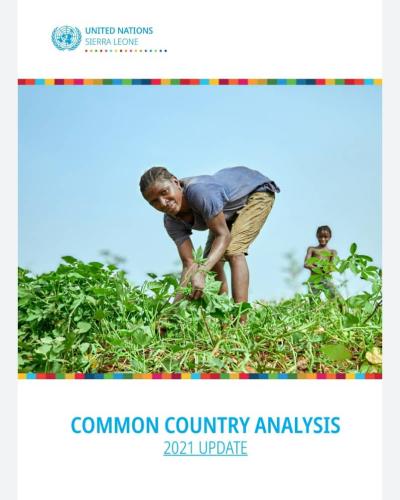COMMON COUNTRY ANALYSIS 2021 UPDATE

2. Executive Summary
Sierra Leone’s macroeconomic situation remains challenging despite the implementation of bold policy measures since 2018. The economy remains vulnerable to shocks that worsen the economic well-being of the country. The COVID-19 pandemic had a devastating impact on the Sierra Leone economy, impeding inclusive economic growth and poverty reduction. Growth contracted to -2 per cent in 2020, mainly due to a slowdown in the tertiary and service sectors (tourism and trade, including supply chain disruptions of impeding imports) and dampening manufacturing and construction due to the suspension of international flights.
Government’s COVID-19 containment measures further affecting agricultural production, local and regional trade and mineral production and exports. Economic growth rebounded by 2.9 per cent in 2021, reflecting the easing of COVID-19 restrictions and government fiscal response to the pandemic. Growth is expected to remain strong at 5 per cent in 2022, supported the recovery in agriculture and services.
The country has made several strides in developing several policies and legal reforms aimed at enhancing institutional capacity for service delivery in sectors relating to justice, security, human rights, and democratic governance. However, the effective administration of justice at national and local levels continues to be challenged by limited institutional capacity and logistics, while the appointment and security of judges’ tenure may challenge the independence of the judiciary.
Sierra Leone’s vision on climate mitigation and adaptation is supported by the proposals in the National Climate Change Policy (NCCP), which was revised in early 2021. This comes at a time when Sierra Leone’s vulnerability to climate change risks remains high, despite the meagre contribution to global greenhouse gas emissions. Prominent factors that contribute to climate change risks include deforestation, which is rapidly accelerating in Sierra Leone, intense and frequent storms, as well as flash floods, which affected more than 220,000 people along the coast of Freetown.
Moreover, an increasing population in the coastal communities have had an adverse impact on the coastal environment. These include uncontrolled construction of shelters and the unsustainable
exploitation of coastal and marine resources, such as sand, aggregates, fisheries resources,
mangroves etc.
Food insecurity in the country is very high, including among rural people and farmers who mobilize a significant portion of their income for food expenditures. The percentage of households spending more than 75 per cent of their income on food is about 74.1 per cent. Despite the continuous prioritization of rice in all the national development plans, Sierra Leone continues to be a net importer of the staple.
After the severe deterioration in 2020, Sierra Leone’s fiscal position is projected to improve this year on the back of expenditure rationalization and improved tax collections. In a bid to improve access to finance and deepen financial inclusion, plans are at an advanced stage for the installation of a National Payments Switch. This will promote the use of electronic payments and digital platforms by Government and businesses to pay for goods and services.




















